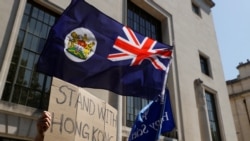A new law requiring Hong Kong public schools to raise the Chinese flag and sing China’s national anthem once a week can be “dangerous” and “ineffective” as part of a move by Beijing to promote a sense of Chinese identity in Hong Kong among students, according to experts.
Starting at the beginning of next year, all public kindergartens and primary and secondary schools in the former British colony will be required to display the national flag on every school day and conduct a flag-raising ceremony with singing of the national anthem once a week.
The mandate was announced after the contentious national anthem ordinance took effect in mid-June this year. It criminalizes any act authorities consider “insulting” to the national anthem or the national flag. Offenders are subject to a maximum fine of over $6,400 and three years in jail. It is widely seen as the government’s move to muzzle opposition voices, after Hong Kong football fans booed the Chinese national anthem at several games.
The new policy aims to “promote national education and help students develop a sense of belonging to the country, an affection for the Chinese people and enhance their sense of national identity,” according to an Oct. 11 government statement.
More than 80% of public schools have been seen raising the Chinese flag more frequently this year than before, according to a survey from the Hong Kong Federation of Education Workers.
Jack, a 17-year-old secondary student who wants to stay anonymous out of fear of repercussions, said his current school is one of them. He and other students are required to stand up and sing the national anthem during a flag-raising ceremony each Friday morning.
“This [new policy] might work on some younger students like those in the kindergarten, but some others like us. It is rather annoying and makes us grow even more repulsed at the ritual,” Jack told VOA.
His school used to conduct the flag-raising ceremony about once a year during special occasions but the frequency shot up this year amid authorities’ increasing pressure to promote national identity awareness.
Jack is among those in his class who refuse to sing the national anthem during the classroom ceremony. Their class teacher, who requested anonymity for the same reason as Jack did, said no one in the class takes it seriously.
“Some teachers and students don’t like the new policy, so we stand, but we don’t sing. Singing the national anthem or not is not important -- it’s just a ritual. Do you think students grow more pro-China the more times they sing?” the teacher told VOA.
Jan Currie, professor of education at the Murdoch University who wrote a book on Hong Kong’s academic freedom, called the new school mandate an “indoctrination.”
“The policy … is the start of trying to make them [students] Chinese citizens in a one-China nation. It is much like what happened in Eastern Europe in the aftermath of WWII, when the Soviets occupied those countries and began to form the youth into communist-believing children and young adults,” Currie told VOA by email.
“It is a form of soft indoctrination that begins with things like having the children identify with the flag and the national anthem, and then will encroach on the curriculum to introduce Marxism-Leninism-Maoism,” she said.
Students in Hong Kong will also be educated on the “history and spirit of the national flag and national emblem, the regulation of displaying and using the national flag, and the etiquette to be followed in a national flag-raising ceremony,” a spokesperson for the city’s Education Bureau said in a statement.
Under the national security law, students “making insulting gestures or adding insulting signs to the national flag while singing the national anthem” are considered offenders, according to an editorial in China’s state media outlet Global Times.
“We teachers are told to take students who don’t cooperate outside the classrooms, or in a large-scale ceremony, outside the hall,” Jack’s teacher said.
“Schools will not call the police though, because they also don’t want to lose face,” she said.
Asked if the new mandate will be effective, Currie predicted, “the new policy may be effective if they start with the very young and look at playing a long game that will take a generation or two to change. It may be more difficult today because social media can also draw the youth in other directions.”
Jack’s teacher also showed reservations about the effectiveness of the new mandate.
“Hong Kong students are not the same as the ones in mainland China. They have been trained on critical thinking, and challenge teachers when they can,” she said.
“Other measures, like allowing students to understand Chinese culture and talk with mainland Chinese, will be much more effective than this ritual,” she added.





